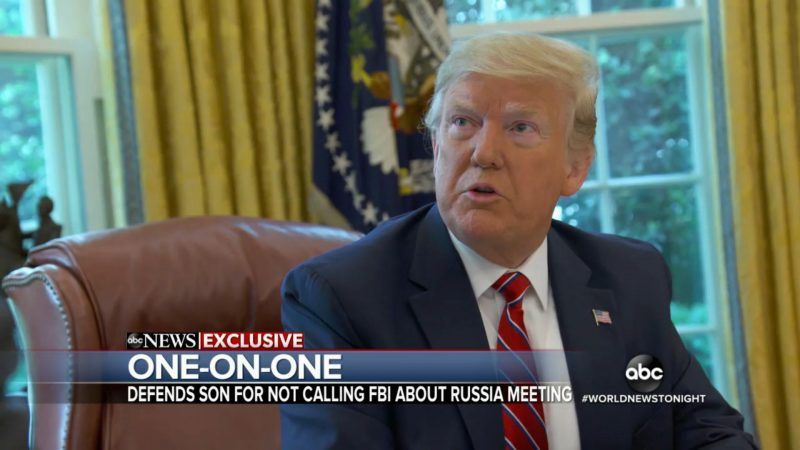Is Accepting Information About a Political Opponent From a Foreigner 'an Assault on Our Democracy'?
Nancy Pelosi's overwrought take on Donald Trump's receptiveness to "oppo research" is hard to take seriously.

One of Donald Trump's redeeming (and entertaining) qualities is that he tends to say exactly what he thinks, without regard to appearances. Yesterday, for instance, ABC News anchor George Stephanopoulos asked the president what his re-election campaign should do "if foreigners, if Russia, if China, if someone else offers you information on an opponent—should they accept it, or should they call the FBI?" Trump responded candidly: "I think maybe you do both. I think you might want to listen. There's nothing wrong with listening. If somebody called from a country—Norway—[and said], 'We have information on your opponent,' oh, I think I'd want to hear it."
That response provoked predictably over-the-top criticism from Trump's opponents. "It's a very sad thing," House Speaker Nancy Pelosi (D-Calif.) told reporters today. "That's an assault on our democracy." Yet Trump's take is a lot closer to the legal, moral, and practical reality of the situation.
While Trump allowed that "if I thought there was something wrong, I'd go maybe to the FBI," he was generally dismissive of the notion that the mere offer of information would qualify. "You're a congressman," he said. "Somebody comes up and says, 'Hey, I have information on your opponent. Do you call the FBI?…You don't call the FBI. You throw somebody out of your office, you do whatever you do….You go and talk honestly to congressmen, they all do it. They always have. And that's the way it is. It's called 'oppo research.'"
The context of this discussion, of course, is Donald Trump Jr.'s June 2016 meeting at Trump Tower with a Russian lawyer claiming to have "dirt" on Hillary Clinton. The elder Trump was emphasizing that, in his view, his son did nothing illegal or wrong by agreeing to the meeting (during which no useful information materialized, according to Trump Jr.) or by failing to notify the FBI about it.
Some of the president's critics have argued that the Trump Tower meeting violated a federal law that prohibits foreign nationals from contributing "anything of value" to a political campaign. But that interpretation is controversial. As Special Counsel Robert Mueller noted in his report on Russian attempts to influence the 2016 presidential election, "No judicial decision has treated the voluntary provision of uncompensated opposition research or similar information as a thing of value that could amount to a contribution under campaign-finance law." Given that uncertainty, it would be hard to make the case that Trump Jr. knowingly violated the law, which is required for a conviction.
Furthermore, if the law were understood to cover situations like this, it would effectively criminalize constitutionally protected speech. Mueller noted that "such an interpretation could have implications beyond the foreign-source ban," such as limits on campaign contributions by Americans, and "raise First Amendment questions."
Trump, in other words, is on solid ground in arguing that such contacts are legal. Whether you also agree that "there's nothing wrong with listening" will depend on whether you share Pelosi's hysterical view that accepting or using information about a political opponent amounts to "an assault on our democracy" when the source is not a U.S. citizen.
Although Trump obviously does not share that view, he is intermittently aware that other people do. He clearly was worried that the Trump Tower meeting would make him look bad, which is why he tried to conceal the real motivation for it after The New York Times broke the story in July 2017.
From an ethical perspective, however, the relevant question is not the nationality of a source offering "oppo research" but the accuracy and relevance of the information. Another consideration is whether the information was obtained illegally—by hacking emails, for example. While the Supreme Court has said people have a First Amendment right to share illegally obtained information if they were not involved in the lawbreaking (something that news organizations frequently do), you might reasonably argue that they should also report such crimes when they become aware of them, which may be what Trump had in mind when he said he might contact the FBI "if I thought there was something wrong."
When politicians or their minions spread information about their opponents that is irrelevant, misleading, or false, Pelosi seems to think, that is just democracy in action, as long as no foreigners were involved. But when they use information from a foreign source, no matter how accurate or germane it is, our political system is in grave danger. To be fair to Pelosi, that view seems to be widely shared within Congress, the intelligence community, and the mainstream press. That doesn't mean it makes sense.

Show Comments (157)